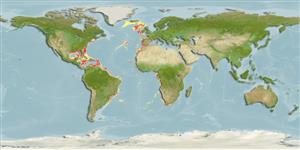>
Ophidiiformes (Cusk eels) >
Ophidiidae (Cusk-eels) > Neobythitinae
Etymology: Luciobrotula: Latin, lucius = pike + Latin, brotula, -ae = little, bud, shoot (Ref. 45335).
More on author: Cohen.
Environment: milieu / climate zone / depth range / distribution range
Ökologie
seewasser bathydemersal; tiefenbereich 220 - 1830 m (Ref. 83453). Deep-water
Atlantic Ocean: Caribbean Sea, Gulf of Mexico, northwards along the American coast to 39°42’N, 71°27’W.
Size / Gewicht / Alter
Maturity: Lm ? range ? - ? cm
Max length : 61.0 cm TL Männchen/unbestimmt; (Ref. 3686)
Rückenflossenstacheln (insgesamt) : 0; Rückenflossenweichstrahlen (insgesamt) : 91 - 96; Afterflossenstacheln: 0; Afterflossenweichstrahlen: 68 - 74; Wirbelzahl: 56 - 57. This species is distinct in having the following set of characters: lateral line ends below dorsal fin rays 24-32 or ca. above anus, sagittal otolith with distinct concavity in dorsal rim in specimens longer than ca. 300 mm, head and body of same colour and absence of occipital and interorbital pores (Ref. 83453).
Not often encountered but probably locally abundant (Ref. 34024). Oviparous, with oval pelagic eggs floating in a gelatinous mass (Ref. 205).
Life cycle and mating behavior
Geschlechtsreife | Fortpflanzung | Ablaichen | Eier | Fecundity | Larven
Nielsen, J.G., 2009. A revision of the bathyal genus Luciobrotula (Teleostei, Ophidiidae) with two new species. Galathea Report 22:141-156. (Ref. 83453)
IUCN Rote Liste Status (Ref. 130435: Version 2024-1)
Bedrohung für Menschen
Harmless
Nutzung durch Menschen
Fischereien: nicht kommerziell
Tools
Zusatzinformationen
Download XML
Internet Quellen
Estimates based on models
Preferred temperature (Ref.
123201): 5.2 - 13.1, mean 8.4 °C (based on 353 cells).
Phylogenetic diversity index (Ref.
82804): PD
50 = 0.5156 [Uniqueness, from 0.5 = low to 2.0 = high].
Bayesian length-weight: a=0.00380 (0.00167 - 0.00864), b=3.14 (2.94 - 3.34), in cm total length, based on LWR estimates for this (Sub)family-body shape (Ref.
93245).
Trophic level (Ref.
69278): 3.7 ±0.6 se; based on size and trophs of closest relatives
Widerstandsfähigkeit (Ref.
120179): mittel, Verdopplung der Population dauert 1,4 - 4,4 Jahre. (Preliminary K or Fecundity.).
Fishing Vulnerability (Ref.
59153): Moderate vulnerability (44 of 100).
